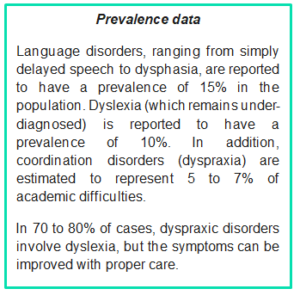Specific Language and Learning Disorders (SLLD) in children and adolescents: towards structured responses to avoid pathway disruptions

Paris, April 11, 2017 – In an average primary school class, it is estimated that 2 to 4 students require special support due to a Specific Language and Learning Disorder (SLLD). Despite the high prevalence, these disorders remain under-diagnosed and under-managed, which can lead to serious academic difficulties for children. Faced with these problems, the public authorities wish to implement stepwise responses, requiring the coordinated intervention of the various stakeholders. Alcimed is currently supporting the implementation of such structures in Normandy.
 SLLD: what is it all about?[1]
SLLD: what is it all about?[1]
The main learning problems in children are “dys” disorders: dyslexia, dyspraxia, dysphasia, dyscalculia, etc., each specific to a cognitive function (written language, oral language, gestures, etc.).
While not involving intellectual disability, they are often associated with other symptoms (behavioral disorders, aggressiveness, etc.) that require the intervention of multiple stakeholders who must coordinate their actions: health and paramedical monitoring (speech therapy), medico-social support, educational adjustments, etc.
Many difficulties encountered by children and their environment as well as by the professionals who support them
When not properly managed, the disorders can cause great difficulties for children, especially at school.
“The journeys of children with SLLD and their families are often complex if they are not thought of on a regional scale. The challenge is to organize pathways to promote the earliest possible care, to avoid people entering into the compensation scheme.” explains Marie-Sophie Ferreira, Project Manager in public health policies at Alcimed. To design this structure will require overcoming certain difficulties that were observed during a study conducted by Alcimed in 2016 for the ARS of Normandy[2]:
- A fragmented and poorly visible offer of services (care, education, medical-social, etc.) on the territories, which can lead to the discouragement of families and disruptions in the process.
- Administrative obstacles, in particular difficulties encountered with dual care, which limit the implementation of appropriate solutions.
- A lack of mutual recognition and professional exchange that hinders actors from different fields in the complementary coordination of their interventions.
- Obstacles in the identification and diagnosis of disorders, which may be linked to the fragmentation of the offer or the lack of training of some stakeholders.
- Reference centers overloaded with situations that can be handled by local actors.
To avoid pathway disruptions or family wandering, the answers provided evolve and tend towards the structuring of stepwise pathways
To face these difficulties, national recommendations[3] focus on establishing qualified organizations to coordinate health, educational or adaptive care in partnership with the PMI and the school in a spirit of solidarity between stakeholders.
In this sense, Alcimed supports the Normand actors in the definition of the lines of action in the regions:
- 1st line: identification and screening for disorders (families, teams from PMI, school, community doctors, speech therapists, etc.)
- 2nd line: evaluation, multidisciplinary diagnosis, announcement of the diagnosis to families, and according to the needs of health and/or educational care and/or medico-social support (CMP, CMPP, CAMSP, multidisciplinary teams operating in a network, etc.)
- 3rd line: support, training of 1st and 2nd line professionals, territorial animation, diagnosis and evaluation of complex situations (Regional Reference Centre on SLLD).
“Territories must now take advantage of national recommendations and good practices and adapt them to the specificities of the offer in question”, concludes Marie-Sophie Ferreira, Project Manager in Public Health Policies at Alcimed.
[1] Action plan TSL 2006, CP AFPA May 2015, guide CNSA, circulaire DHOS/O 1 n°2001-209
[2] Alcimed supported the ARS of Normandy in defining an action plan for Eastern Normandy to improve the identification, diagnosis and care of specific language and learning disorders
[3] In particular, the support guide for the development of responses to the needs of people suffering from Dys Disorders, published by the CNSA in December 2014
 SLLD: what is it all about?
SLLD: what is it all about?